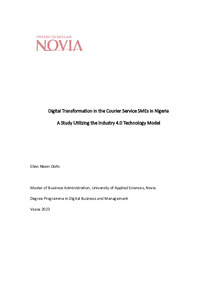Digital transformation in the courier service SMEs in Nigeria : A study utilizing the Industry 4.0 technology model
Osifo, Ellen Nkem (2023)
Osifo, Ellen Nkem
2023
All rights reserved. This publication is copyrighted. You may download, display and print it for Your own personal use. Commercial use is prohibited.
Julkaisun pysyvä osoite on
https://urn.fi/URN:NBN:fi:amk-2023121336735
https://urn.fi/URN:NBN:fi:amk-2023121336735
Tiivistelmä
In contemporary times, industries are moving from manual business activities to digitalization, which helps ameliorate operational incapability and improve productivity. In the courier industry, digital transformation has led to the evolution of Industry 4.0, which refers to the integration of new technologies into supply chain and production operations. Industry 4.0 has been known to impact the courier service positively; its technologies (digital tools) make it possible for operations to be done in real time with little or no human assistance. However, in developing countries like Nigeria, it is not easy to ascertain the impact and success of this digital shift with the application of Industry 4.0 in the courier service SMEs as only a few cases have been adduced.
This study has examined how digital transformation with the application of Industry 4.0 and its technologies can impact courier services SMEs in Nigeria, as well as the challenges of implementing them.
For the most part, I have used the qualitative method in the form of a semi-structured interview guide to collect primary data. Ten employees from the case company, Tranex PLC, were interviewed. Secondary data that were used were derived from a variety of sources such as reports, books, Google Scholar, relevant internet publications, etc.
This research, based on empirical evidence, has revealed that there is a connection between Industry 4.0 and improved courier services, however, the degree of impact on SMEs is uncertain. This is because SMEs have not yet embraced the idea due to the challenges of financial and human constraints. There is an explicit gap in the availability of resources to small and large enterprises in Nigeria, which has made it impossible for courier service SMEs in Nigeria to ascertain the impact of Industry 4.0 technologies.
This study has examined how digital transformation with the application of Industry 4.0 and its technologies can impact courier services SMEs in Nigeria, as well as the challenges of implementing them.
For the most part, I have used the qualitative method in the form of a semi-structured interview guide to collect primary data. Ten employees from the case company, Tranex PLC, were interviewed. Secondary data that were used were derived from a variety of sources such as reports, books, Google Scholar, relevant internet publications, etc.
This research, based on empirical evidence, has revealed that there is a connection between Industry 4.0 and improved courier services, however, the degree of impact on SMEs is uncertain. This is because SMEs have not yet embraced the idea due to the challenges of financial and human constraints. There is an explicit gap in the availability of resources to small and large enterprises in Nigeria, which has made it impossible for courier service SMEs in Nigeria to ascertain the impact of Industry 4.0 technologies.
